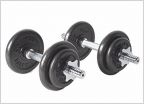-
Welcome to Tacoma World!
You are currently viewing as a guest! To get full-access, you need to register for a FREE account.
As a registered member, you’ll be able to:- Participate in all Tacoma discussion topics
- Communicate privately with other Tacoma owners from around the world
- Post your own photos in our Members Gallery
- Access all special features of the site
DO or MD for Primary Care Doc
Discussion in 'Health' started by Mad German, Apr 7, 2023.


 Dry winter skin
Dry winter skin Adjustable Dumbbells?
Adjustable Dumbbells? Running Tips
Running Tips EpiPen Storage While Camping - How To Keep At Correct Temperature?
EpiPen Storage While Camping - How To Keep At Correct Temperature? Health questions
Health questions



































































